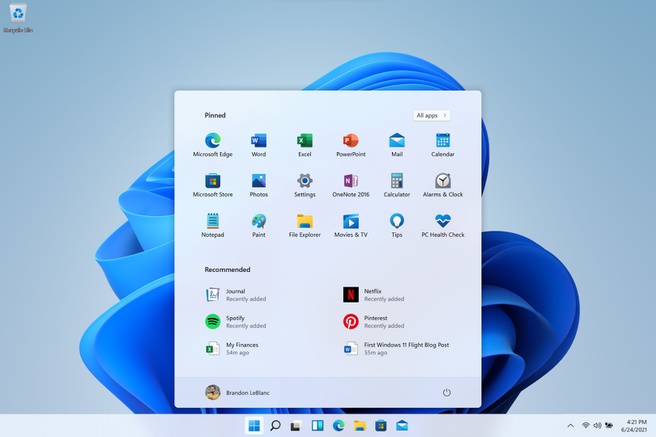Microsoft has released the first official Windows 11 Insider Preview. With this beta, developers and other users can already try out the OS. Windows 11 will be officially released at the end of this year. Upgrades for Windows 10 users will follow from 2022.

The first official Insider Preview for Windows 11, build 22000.51, includes many of the features the company announced last week during the unveiling of the new OS. Among other things, the renewed start menu, the new taskbar, widgets and the revised Microsoft Store are in the first beta version. The explorer, settings menu, and lockscreen also have a new design in Insider Preview Build 22000.51. Windows 11 also adds support for Wi-Fi 6E.
Microsoft does report that some Windows 11 features will not be added until later Insider builds. The company mentions, among other things, support for Android apps in the Microsoft Store and the integration of Microsoft Teams chat. Those features will be added to Windows 11’s Insider channel “in the coming months.”
Users who want to try the preview version of Windows 11 can sign up for the Insider Program by clicking “Windows Insider Program” from the Windows Update settings menu and enrolling. Microsoft officially announced Windows 11 last week, but a beta version of the OS already leaked the week before .
There is still uncertainty about the hardware requirements of Windows 11 . Initially, Microsoft spoke of a ‘soft floor’, which included a TPM 1.2 module and a 1GHz dual-core processor. In the meantime, the Windows 11 page has been modified by Microsoft, stating that a TPM 2.0 module is required, as well as a processor listed by Microsoft as compatible on a list of supported CPUs . Ryzen 1000 CPUs and Intel Core 7000 processors are still missing for the time being. The Insider Preview version also works on systems that do not meet those requirements, Microsoft confirmed last week .
In a separate blog post , Microsoft added on Monday that the company will perform additional CPU tests. “During the release of the Windows Insiders build and in conjunction with our OEMs, we will conduct testing to identify devices with Intel 7th Gen and AMD Zen 1 processors that may adhere to our principles,” the company said. With this, Microsoft seems to confirm that the release version of Windows 11 does indeed require a CPU from the compatibility list, but that Ryzen 1000 and Intel Core 7000 processors may still be added.











